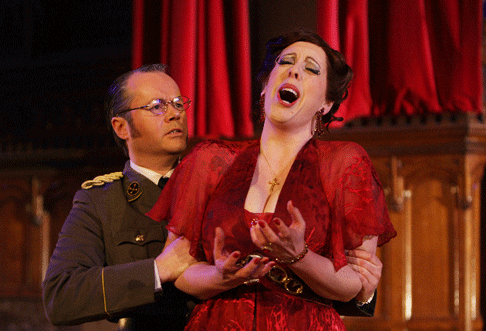08 Apr 2011
Tosca, NI Opera
“Show goes on despite fresh bomb scare”. Not exactly the sort of headline a new opera company might have dreamt of for its inaugural production.

“Show goes on despite fresh bomb scare”. Not exactly the sort of headline a new opera company might have dreamt of for its inaugural production.
It’s what happened to Northern Ireland Opera, however, on day two of its Tosca staging, when a device planted by dissident terrorists (the second in five days) forced the rapid abandonment of St Columb’s Cathedral in Londonderry, the Act One venue in this site-specific staging. The show did indeed go on: Act One as a concert performance, Acts Two and Three in the city’s Guildhall and St Columb’s Hall, as scheduled. “We were prepared and decided we were going to go ahead with it anyway”, commented conductor Nicholas Chalmers stoically. “We will not be beaten”.
Artistically the production was a triumph. Its keynote was the studious avoidance of all the blowsiness and bombast which can reduce Tosca to the “shabby little shocker” of operatic legend. Oliver Mears’s staging had shock without shabbiness: in calm, clinical fashion he cut to the political quick of the drama, the raw ingredients of political struggle, state oppression, torture, murder, suicide and religion starkly anatomised in a city where for the thirty years of “The Troubles” (Northern Ireland’s vicious sectarian conflict) they were the lingua franca of everyday existence. A Tosca with contemporary relevance? Just a little…
 Oliver Mears
Oliver Mears
Act Two’s extended confrontation between Tosca and police chief Scarpia was in this respect seminal. Belfast-born Giselle Allen, in her first Tosca, delivered an already sharply modulated and nuanced reading of the part, unleashing fulsome waves of tone in the most straitened outbursts, retaining poise and focus in quieter, self-confessional passages. No surprise to learn that she is already an acclaimed Jenůfa. The Scarpia, Paul Carey Jones, was a study in restrained menace, cold, icy, vocally unhistrionic — and pretty scarifying. Mears utilised the given space (the sober wood-panelling and civic symbols of Derry City Council’s building) superbly: the attempted rape happened within touching distance of the front-row spectators, blood spurted graphically in front of their noses from the stabbing, and audience members filed past the still visible body of the butchered Scarpia, prostrate on a committee table at floor level, to get their interval refreshment. “Strong stuff”, a man next to me commented, adding a pointed reference to a notorious police interrogation centre in Northern Ireland. I said nothing.
 Giselle Allen as Tosca and Paul Carey Jones as Scarpia
Giselle Allen as Tosca and Paul Carey Jones as Scarpia
Earlier Mears had used a completely different logistical lay-out for Act One in St Columb’s Cathedral, the orchestra deployed in a side chapel and behind the altar, the aisle a conduit for the arrival of the dramatis personae and the excellent choir of local schoolchildren who intoned the “Te Deum” lustily, encouraged by the vividly comic and firmly voiced Sacristan of Cork baritone Brendan Collins. Mexican tenor Jesús León, slightly stiffer and less stage-confident than his Tosca, had handsome features and a pleasingly sappy upper voice going for him. His Cavaradossi was brooding, perhaps a touch too interiorised for effective projection. He rose to Act Three’s “E lucevan le stelle” (in English), sung in a cramped, grubbily-tiled police execution chamber where Mears had earlier staged a shockingly literal dumb-show shooting over Puccini’s lengthy orchestral introduction. I wondered what my interval interlocutor might be thinking.
The production as a whole was the very opposite of opera as commodification: there was no desire evident to cushion the rawness of the narrative content, no truck with the idea of opera as plush, comfortable middle-class entertainment. This was Tosca as riveting political drama, visceral without being in any way artificially pumped-up or gimmicky. It made the work seem like a truly great opera, rather than one which is merely massively popular. The audience stood as one at the end, noisily acclaiming what was undoubtedly a momentous evening for Northern Ireland Opera, in a part of the United Kingdom which has been on short (often non-existent) rations operatically throughout its ninety-year history. The new company’s first full (2011-12) season is awaited with the keenest interest.
Terry Blain